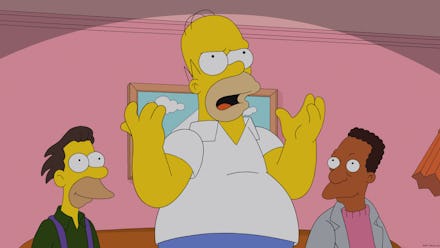One Ridiculous Quote Perfectly Captures What Society Doesn't Get About Obesity

The news: Why are so many fat people OK with being fat? Blame Homer Simpson.
Speaking to BBC Newsbeat, weight loss expert and host of the TV reality series Fat Families Steve Miller said, "The Simpsons is fabulous but Homer Simpson is setting a wrong example of being fat and happy at the expense of being potentially quite poorly. "We have a mega issue with obesity and Homer is wobbly and porky."
Miller went on to demand the show's creator, Matt Groening, put Homer "on a regime that promotes the message that health rocks." He also wanted Homer to talk to the rest of the Simpson family "about how cool it is to be healthy" and to exercise. "The Simpsons is so powerful that it could be a great tool for tackling obesity."
Miller is right to be alarmed by obesity, but he's approaching the problem all wrong. Obesity is a serious problem in the Western world, specifically in the U.S. and U.K.
In Britain, 67% of men and 57% of women are overweight or obese. These obesity levels are higher than anywhere else in western Europe, save for Iceland and Malta.
In the United States, more than two-thirds of the population is overweight or obese. A recent Gallup poll demonstrated approximately 35% of Americans were overweight (meaning a body mass index, or BMI, of 25 to 29) while just under 28% were obese (a BMI of 30 or higher).
This is the highest rate of obesity Gallup has recorded since it started tracking it in 2008.
But blaming Homer is laughable. Obesity is not a result of Homer's antics. It's a result of our sedentary lifestyles, our "supersized" portions, our work schedules that leave us without time to hit the gym, a lack of access to healthy foods for people with lower incomes, and sordid advertising practices. Sometimes, it's simply a person's biology.
Ignoring all this and placing the blame on a cartoon character reaches, shall we say, a Homeric level of stupidity.
Miller's absurd claim prompted a #BlameHomer hashtag where enraged denizens of the Internet took him to task.
The takeaway: Changing a cartoon character's look and behavior won't cure the obesity epidemic. Education about proper nutrition will. For an example, look at the recent movement to change nutrition labels so they clearly explain what calories mean. Did you know you need to run for almost an hour to burn off the 240 calories in a 20-ounce bottle of Coke? The proposed labels would notify consumers about the "exercise cost" of their favorite foods.
That's the kind of solution America and Britain (and the rest of the world) need to fight obesity. Not a Simpsons episode about weight loss.